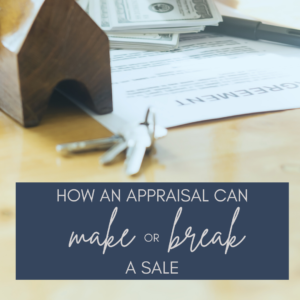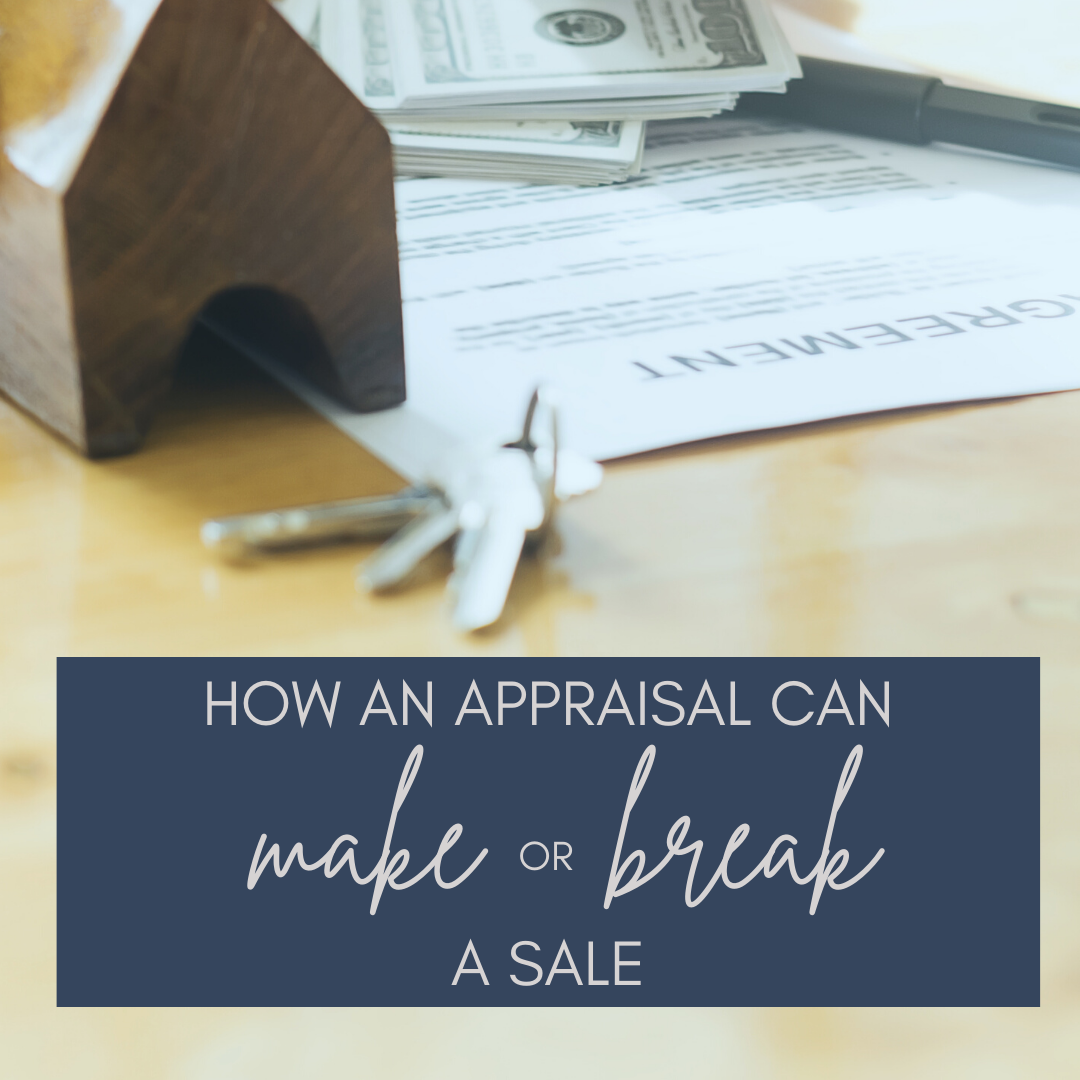Browse around
topics
Hey There!
Owner of MWM Properties. Wife. & Mom of 3!
I'm Jennifer Mestayer
At MWM Properties, our commitment is to exceed the level of trust our clients place in us, and change the way people experience real estate through integrity, transparency, and client-centered care. Read our story
Most Common Misconception we hear at listing appointments...
Sellers
How Much House Can you Afford? A Step by Step Guide
buyers
Get Your Pool Ready for the Texas Summer
homeowner
July Home Favorites
Home favs
Your Go-To Source
From buying & selling to home maintenance tips & market updates, we provide valuable insights to help you protect and grow your investment.
How An Appraisal Can Make or Break a Sale
No home sale is ever final until you get to the closing table. That is a fact and explains why real estate signs say “Contract Pending” before being replaced with “Sold.”

There’s a lot that goes on after a buyer’s offer is accepted by the seller. And a key factor in getting to closing day is the home appraisal by the lender.
When the appraised value of a home comes in below the contract price, it could cause the sale to fall through. No new home for the buyer and no final sale for the seller.
This does happen in the Cypress area despite the bidding wars over homes. Sometimes the price gets pushed up more than what the recent sales would suggest is the value of the home.
What can you — as a buyer or seller — do to prevent a low appraisal or, in the event of a low appraisal despite doing everything right, still have the sale go through? Read the strategies and insights below and to understand and prepare for one of the most important yet overlooked part of a home sale—the appraisal.
Home Appraisal 101
First, let’s discuss the basics of the appraisal process—what it is and why it’s a necessary step as part of a purchase.
A bank needs to make sure that the money they are lending for a home is for a home that is habitable, exists and also that they are not lending more than the value of a home in case of the worst-case scenario, a foreclosure.
To that end, the bank will hire a licensed appraiser to visit the home and do two things. One, the appraiser needs to make sure the home is habitable and two, the appraiser tours the home to make notes about how it compares with the other homes that have recently sold nearby. These homes are called comparable or “comps” for short.
Then, the appraiser will look at the comparables (sales over the last 12 months) to help determine the current value of the home that someone is buying. The valuation is also based on market trends, supply and demand, time on market, and takes in consideration any extenuating factors such as upgrades or something like being on a higher floor or end unit.
Since it’s never an “apple-to-apple” comparison, the appraiser will make adjustments to the appraisal for some features of a home — a finished basement, a coveted view, updated appliances or HVAC systems. Remember, however, some improvements don’t add as much value as you would like … such as a new half bath, landscaping, etc.
Interesting fact…appraisers don’t use price per square foot. The form required by the state of Texas uses total price with a plus and minus adjustments to that total price.
Appraisal Law Changes Process
The appraisal process went through a change a few years back when the Home Valuation Code of Conduct was passed. This law was meant to make appraisers more independent and not “hired” by the real estate agents, buyer, seller, or even the bank/ lender handling the transaction.
But in some cases, appraises may not be local to the area where they were appraising homes, especially when appraisal management companies are involved.
There’s been some questioning of how well these appraisers know the neighborhoods and the “true” value of a home when an appraisal comes in too low.
What a Buyer Can Do
If you’ve found a home you love but the appraisal comes in too low, you’ll need to consider several options. Should you still purchase the home if the value is lower? Do you think the appraisal is not accurate in the current demand or the market? It’s good to have a strategy in place.
Remember, the seller wants to sell their home. Even though they would love the higher contract price, they may have to renegotiate with you but most likely will appeal the low appraisal as a first course of action.
- If you think the appraisal is flawed, you can challenge the appraisal. As a buyer, you now have the right to receive a copy of appraisals and computer valuations and other data.
- Switch lenders to start over again with a new appraiser.
- Save more money so you have more leeway in putting more down or making up the difference on a low appraisal if you truly want the home and there are other buyers in line to snap it up. Many offers are being submitted with an appraisal waiver amendment. This agreement assures the seller the buyer does have the extra cash to pay any difference between the offered price and the appraised
- Work with the seller to see if they will lower the price or help pay for some of the closing costs or any other costs.
- Make sure your offer included an appraisal contingency so that you do have the option to exit the sale if it the value of the home is lower than the contract price. However, having this contingency may weaken your initial offer if it’s a competitive market.
What a Seller Can Do
If an appraisal comes in lower than the contract price, it may mean the end of the sale with this particular buyer. However, there are steps you can take to help avoid this and to also move the sale along.
It might be worth the time to work with this buyer rather than start all over again, but you just might have to do that if many of these actions below don’t work.
1) Provide details on any home improvements to the appraiser so nothing is missed. Part of my listing package is a notebook that outlines all features both in and around the property to make sure both the buyers and the appraiser is aware of all features, upgrades, schools, neighborhood features, etc that add value to the property.
2) Ask to review the appraisal to see if any adjustments were made, especially if you submitted information to the appraiser. A lender has to comply with the request within 30 days.
3) Appeal the appraisal for a reconsideration of the value of the home. Provide the comparables you and your agent think represent the home’s value better and why. You will need to show any discrepancies between the appraisal and any improvements or unique features of the home.
4) Ask for another appraisal, but you would have to pay for it. However, if it’s an FHA loan, an appraisal stays with that home for 6 months so you can’t ask to switch lenders or get a new appraisal.
5) Ask the buyers if they are willing or able to pay for the higher contract price and make up the difference themselves. Some buyers may be willing or able to make a larger down payment. If it’s a tight market, the buyers may feel the pressure to pay since there could be another buyer in line who is able and willing.
6) Renegotiate with the buyer and to offer a lower price or pay for closings costs. If you don’t have any other potential buyers, you may need to make such accommodations so that the sale does go through.
7) If you’ve got an all-cash buyer in the mix, you won’t have to deal with a bank or appraisals at all. That’s a big plus as a seller.
As you can see, a lot goes on “behind the scenes” during the appraisal. The good news is that both buyers and sellers have options to continue the sale if the appraisal comes in too.
This part of the home buying process can feel mysterious and overwhelming, but that’s what I’m here for! Email me and we can talk more about it so you understand things fully. It’s never too early to start! Plus, understanding the process makes moving forward a whole lot less nerve-racking once you are ready. I’m looking forward to hearing from you and helping you.
Pin
Share
Leave a Reply Cancel reply
3 Beds
3 Baths
Spring Branch are
8624 Emnora
4 Beds
3 Baths
Oakcrest
17823 Dappled Walk Way
5 Beds
4.5 Baths
Lakes of Fairhaven
20803 FAirhaven crossing
2 Beds
2 Bath
Willowbrook Area
12719 Monaco Road
4-5 Beds
3 Baths
Galveston
4119 Courageous Lane
7926 Millers Way
4 Bed
2.5 Bath
Copperfield area
MWM Listings You Will
Previous Story
next Story
Looking to become a homeowner and not sure where to begin? Grab this guide for a full checklist, questions to ask yourself and a roadmap HOME!
MWM Let's Find Home Guide
DOWNLOAD
© 2025 MWM Properties + Real Estate + IABS + Consumer Protection Notice
Get the free guide & get started on your home purchase!
MWM Find Home
Join Us on Insta
MWM Manifesto *Glorify God *Serve People *Pursue Excellence
We are so glad you're here, stick around, there's so much to see!
